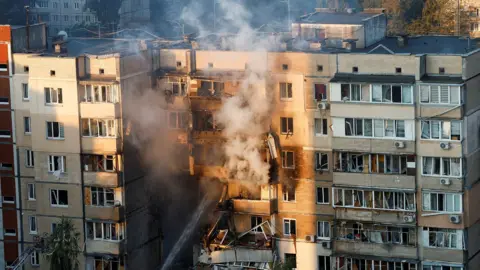Donald Trump has threatened tougher sanctions against Russia after its heaviest aerial bombardment on Ukraine since the war began.
Sunday's strikes killed four people, including a mother and her baby, and damaged Ukraine's main government building in Kyiv for the first time.
The attack - which Ukraine said involved at least 810 drones and 13 missiles - has led to growing calls for stronger Western action against President Vladimir Putin.
Kremlin's spokesman Dmitry Peskov said Monday that no sanctions would ever be able to force Russia to change the consistent position that our president has repeatedly spoken about.
Speaking to reporters after the bombardment, Trump expressed his dissatisfaction with the situation.
While Trump has previously threatened harsher measures against Russia, he had not acted when Putin ignored his previous warnings. When asked on Sunday if he was prepared to escalate sanctions further, Trump replied, Yeah, I am, but did not provide specific details.
This response aligns with recent remarks from U.S. Treasury Secretary Scott Bessent, who indicated that Washington is ready to intensify economic pressure but requires stronger backing from European allies.
Bessent stated that if EU nations increased sanctions and secondary tariffs on countries buying Russian oil, it could collapse the Russian economy and force President Putin to negotiate.
Thus far, the most aggressive action from Washington was imposing a 50% tariff on imports from India due to its continued purchase of Russian oil. Trump has suggested extending secondary sanctions to additional nations but has yet to implement this.

European leaders are expected to visit Washington in the upcoming days to discuss strategies for curbing the war. Trump noted that certain leaders are coming individually on Monday or Tuesday but did not specify who they are. He signaled intentions to speak with Putin soon.
Ukrainian President Volodymyr Zelensky also urged European nations to cease all Russian energy purchases, praising Trump's tariff strategy as a vital step toward crippling Moscow's revenue streams.
According to estimates, since its large-scale invasion of Ukraine in March 2022, Russia has generated approximately $985 billion from oil and gas exports, with China and India being key buyers. The EU, while decreasing its imports, is aiming to eliminate Russian energy reliance by 2027.
Despite sanctions, Russia continues to seek market expansion, even securing agreements to bolster gas supplies to China in a recent Beijing meeting. Meanwhile, OPEC+ has decided to increase oil production, which could undermine Western efforts to financially pressure Moscow.




















